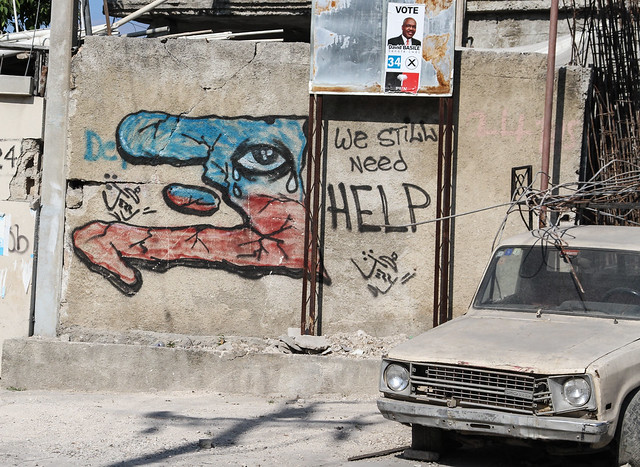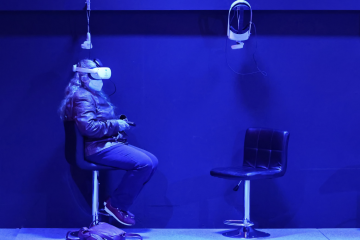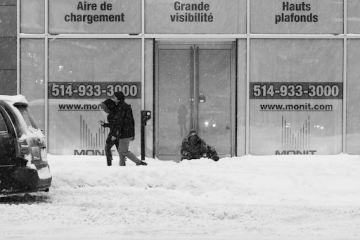Disclaimer: this article contains reports of violence and sexual violence that may be disturbing to the reader.
Since the assassination of Haiti’s former president, Jovenel Moïse, in July 2021, the small Caribbean country has plunged into a devastating wave of gang violence, which Ariel Henry, Prime Minister of the caretaker government, has been unable to quell. To this day, gangs control about 80% of the country’s capital city, Port-au-Prince, and violence has also spread to the periphery and other big cities like Gonaives and Cap-Haitien.
In Port-au-Prince, gangs have terrorized the local population with assassinations, kidnappings, torture, and rapes as they vie for territorial expansion, provoking the displacement of thousands of Haitians from their homes to makeshift shelters where they are more vulnerable than ever. According to the United Nations’ Office of the High Commissioner for Human Rights (OHCHR), over 2,400 people have died in gang violence in the period between January 2023 and August 15, 2023 alone, and countless instances of rape, including collective rape, have been recorded. The OHCHR denounced gangs’ systematic use of sexual violence as a strategic weapon to instill fear among the population and expand territorial control.
In order to understand the systematic use of sexual violence by gangs in Haiti, I interviewed Pascale Solages, co-founder and general coordinator of Nègès Mawon, in November 2023. Nègès Mawon is a Haitian feminist organization whose foundational purpose is to fight against the consequences of patriarchy, sexual violence, and the oppression of Haitian women. Since the outbreak of gang violence in the country, Nègès Mawon has played an active role in helping victims of sexual violence.
While the interview was conducted in French, it has been translated into English for the purpose of this article. The interview has also been edited for brevity and clarity.
Benjamin: What can you tell me about the situation in Haiti today? How has it evolved since 2021?
Pascale: It hasn’t changed much. Haiti is still under crisis and there have been no elections since 2015. Since the murder of President Jovenel Moïse in 2021, the country is de facto under the command of Prime Minister Ariel Henry and the state institutions are very weak and unable to fulfill their roles towards the citizens.
Gangs now control about 80% of Port-au-Prince and over 60% of the entire country, and they keep on expanding their influence day after day. They have access to enormous quantities of weapons, which they use to conduct attacks, kidnappings, and rapes while displacing thousands of people living in the zones they take control of. Many of these people are displaced internally, but many also flee to the nearby Dominican Republic, Nicaragua, the United States, and Canada.
Benjamin: I’ve read about how gangs use sexual violence as a weapon to terrorize Haitians and expand territorial control. What is the scale of this violence and how easy is it to assess it?
Pascale: We know that very few cases are reported. According to a report conducted by 8 local organizations in 8 of Haiti’s 10 departments, almost 4,000 cases of sexual violence were recorded between January 2021 and October 2021. When rival gangs vie for territorial control, they resort to the systematic rape of women, which they consider as a marker of their victory. Yet rapes also take place within neighborhoods, where many inhabitants cannot afford to flee their homes and women are subject to repeated rapes. This is the case in Cité Soleil, Haiti’s biggest shantytown, where women’s bodies are merchandised by gangs.
Gangs also control many of the important roads around the capital, which has led to countless instances of kidnappings and rapes of Haitians on buses. As a result, many Haitians have resorted to the plane to travel between departments, but the poorest who cannot afford to take the plane face no other choice than to risk the road. Many women have to take the bus to conduct their small trades and provide for their families at their own risk.
Recently, eight women were kidnapped by gang members on the road to the North department and were sequestered for four days, during which they were beaten and collectively raped on several occasions. The men who kidnapped these women also forced them to do all their domestic chores such as washing their laundry and stole all their merchandise, which represented these women’s only source of revenue. One of the women lost an eye because of the beatings she was subjected to, while another became pregnant following her rape.
Gangs’ mode of operation disproportionately impacts women and children, who constitute Haiti’s most vulnerable and largest share of the population. When women flee to seek refuge, they are all the more vulnerable to rape while on the road or even in shelters, which was the case when people took refuge in a sports center in the southwest of Port-au-Prince. Numerous instances of rape took place in the sports center because women were even more vulnerable to violence, having no home or money. Male refugees took advantage of their precariousness to rape them in exchange for refuge, food, or clothing. Even among the victims of gang violence, patriarchal dynamics operate as men still have the means to abuse women. From an intersectional perspective, poor women are the most vulnerable. While wealthier women are without doubt impacted as well, being subjected to kidnappings and rapes too, they are less vulnerable than these women living in shantytowns and forced to trade in neighborhoods controlled by gangs.
Benjamin: What is the objective of Nègès Mawon, and how does it seek to help female victims of sexual violence by gangs?
Pascale: Nègès Mawon provides medical care to women victims of violence, who sometimes need surgical operations, as well as psychological support. The organization also provides legal support through lawyers, and economic support to the women in need. In 2017, we created the “marrainage” program, a women’s peer-support system that seeks to take charge of and support women and girls survivors of violence. This program seeks to complement the organizational support listed above. Over 40 young women from the organization act as sponsors to Haitian women in need. They are available 24/7 in case these women need to move from one point to another, or if they need to talk or see someone for whatever reason. The goal of this approach is to go beyond the organizational support which can feel overwhelming to these women and help them through peer-based support.
Nègès Mawon is set to inaugurate its first welcome center in January 2024 to shelter women who were subjected to violence and forced to flee their homes. We also engage in a lot of interviews and write reports to give visibility to the problem of sexual violence in Haiti. Haiti is a small country that doesn’t have a lot of international media coverage, so we need to talk about this issue as much as possible to make it visible. Finally, Nègès Mawon keeps on advocating for the decriminalization of abortion in Haiti, which is the third cause of death in the country. In the context of systematic rapes, it is more than ever a priority.
Benjamin: Recently, the United Nations has approved the launching of a multinational operation led by Kenyan forces whose commitment is “to deploy a contingent of 1,000 police officers to help train and assist Haitian police to restore normalcy in the country and protect strategic installations.” Do you think such an operation could help appease the situation in the country?
Pascale: Absolutely not. Haiti has a long history of such interventions, which resulted in violations of human rights and women’s rights, violence, an outbreak of cholera, and waste of resources. Nègès Mawon has had to support women who were sexually abused by soldiers from such forces and who abandoned their newborn children in Haiti when they left. This is why we are firmly opposed to this operation.
Besides, the Kenyan force has no agenda. They published a report that contained mistakes, and the fact that Kenya itself is under crisis today clearly demonstrates they won’t be able to solve the crisis in Haiti. In fact, we know the proposed operation is first and foremost an economic proposition that would yield a lot of money for Kenya.
An intervention led by Kenyan forces will certainly not solve the crisis of governance which is at the root of the crisis in Haiti. These are repressive forces, which will only lead the gangs to withdraw temporarily and come back upon the end of the intervention. The real problem is economic and political, it’s not just about repression. The Kenyan operation is in no way a durable solution for Haitians.
Benjamin: What then do you think would be a better option to solve the crisis in Haiti?
Pascale: First of all, we need to stop the influx of weapons coming from the United States, mainly from Miami. The United States needs to take responsibility for the influx of weapons and drugs coming from their country. We also have to restore Haiti’s justice and police systems by ending the influence of powerful political and economic actors who instrumentalize gangs to further their own agendas.
Instead of spending millions to put up a foreign intervention force, we should use these funds to finance the Haitian police, the only legitimate force in the country, while weeding out corruption within the institution. We also need to impose sanctions upon the powerful political and economic actors who benefit from gang violence and who took shelter abroad, in Cuba, for example. For this the role of the Haitian justice system is essential, as well as that of United Nations sanctions.
The solution, like the problem, is structural. We need to address the profound causes at the root of the crisis rather than proposing quick and superficial solutions. No miracle is possible and the only solution is to address Haiti’s current crisis of governance [End of the interview].
Benjamin: As Pascale Solage explained, there is no quick and easy solution to the crisis in Haiti. However, the best thing we can do is raise awareness about what is happening there and how women are often the first victims of gang violence. Organizations like Nègès Mawon play a pivotal role in helping these women, but they do not benefit from the resources of a state and are in no way equipped to solve the crisis by themselves. Indeed, this will only be possible with the return of a viable Haitian state, which can only flourish once its institutions are rid of corruption and the influx of weapons from the United States is stopped. Until then, operations such as that proposed by Kenya have no chance of restoring durable peace to Haiti.






